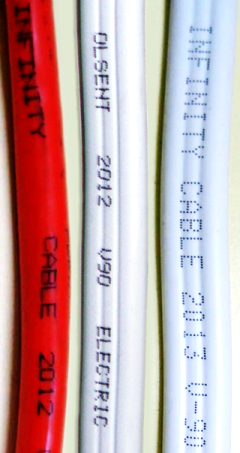Dodgy wires spark big recall
 The ACCC is recalling electrical cables and wires that have been installed in up to 40,000 buildings and homes.
The ACCC is recalling electrical cables and wires that have been installed in up to 40,000 buildings and homes.
The consumer watchdog has urged contractors, builders and suppliers to check their wiring, after it found cables made by Infinity and Olsent had a poor quality plastic coating.
The outer layer can crack and when it is exposed to heat, and authorities say it could spark a fire.
All sizes and configurations of white thermoplastic-sheathed (TPS) and Orange Round Infinity mains power cables are affected.
Eighteen known suppliers have already initiated the recall on ACCC’s request.
Infinity cables were supplied in all states and territories, except the Northern Territory. It is estimated that around 40,000 households and businesses may have been affected.
Olsent power cables sourced from Infinity Cable Co Pty Ltd and solely supplied by Masters Home Improvement are also affected.
The ACCC says cables in question were sold in the following states and years: 2010-2013 (in NSW), 2011-2013 (in ACT), 2012-2013 (in Vic, Qld, SA & WA) and in 2013 (in Tas).
Consumers should not attempt to inspect cables themselves,” ACCC Deputy Chair Delia Rickard urges.
“Careful steps should be taken by a licensed electrical contractor to avoid electric shock or fires from occurring in coming years.
“We also urge electricians and builders to alert their consumers and their cable supplier if they have installed Infinity cables,” Ms Rickard said.
All cables will age at different rates subject to ambient temperature and the load placed on them. Current expert advice says this cable may become brittle from 2016 onwards, and suppliers have been asked to assess and work on the oldest or highest risk installations first.
ACCC chairman Rod Sims says some suppliers get what they pay for.
“This recall serves as a reminder that companies sourcing or accepting products from less expensive overseas suppliers must have quality assurance processes in place to ensure the safety of consumers,” he said.
“Consumers usually know that the better the bargain the more wary they need to be; consumers would expect companies selling such goods to be wary on their behalf.”







 Print
Print